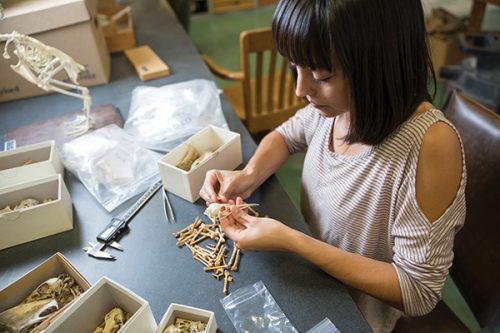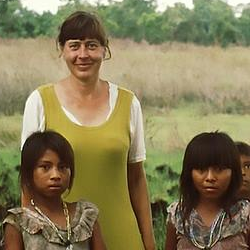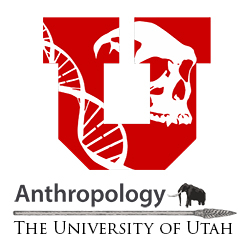Department of Anthropology
A Brief History
Anthropology is the comparative, evolutionary and historical study of human and non-human
primates. Our internationally respected faculty takes a theoretically-driven, empirically-informed
approach to the discipline. Our core mission is to discover and communicate new knowledge
through basic and strategic research, the foundation from which we educate and train
scientifically literate and intellectually engaged citizens and equip them with relevant
skills for the modern world.
The University of Utah has a long history of anthropological and archaeological research.
Henry Montgomery, professor of natural history, began academic archaeological research
at the University in the 1890s. In 1914, Byron Cummings founded the Department of
Archaeology. In
1917, a joint Department of Anthropology and Sociology was created, and in 1926 Anthropology
became a separate department, though briefly reunited with Sociology from 1933 through
1948. The Department grew significantly during the 1960s and 70s and enrollments increased.
At that
time, the faculty approached its present size (15 FTE) and a PhD program was added
to the curriculum. A shift to an evolutionary and empirical focus emerged in the mid-1980s.
This continues today: the department is recognized for its unified scientific and
evolutionary approach to major
questions in the discipline and cognate fields, including biology, environmental science,
geology, and human genetics.
Upcoming Events
January 8th Colloquium Speaker
Joy Reidenberg, Ph.D.
Professor, Comparative anatomist at Icahn School of Medicine at Mount Sinai
"Beauty IN the Beast"
Comparative Anatomy of Sound Production from Humans to Whales
Thursday, Jamuary 8th
2:15 pm
Hinckley Inst. of Politics (GC 2018)
Click here to RSVP for Zoom link
BIOSKETCH: Dr. Joy S. Reidenberg
Joy S. Reidenberg, Ph.D. is a comparative anatomist, specializing in comparative anatomy. She is a Professor in the Center for Anatomy and Functional Morphology at the Icahn School of Medicine at Mount Sinai, NY, USA. Her degrees are from Cornell University (B.A. 1983) and Mount Sinai’s Graduate Program in Biomedical Sciences (M.Phil. 1986, Ph.D. 1988). Dr. Reidenberg also held appointments as Guest Investigator at Woods Hole Oceanographic Institution, and Associate Scientist at National Museum of Natural History (Smithsonian Institution). She is a Fellow of the American Association for Anatomy, and an inaugural Fellow of the Society for Marine Mammalogy.
Dr. Reidenberg teaches Human Gross Anatomy, Histology, Embryology, Imaging to medical and graduate students, and participates in several anatomy courses for surgeons. Her international reputation for teaching excellence is evident from her many teaching awards, including the Basmajian Award for Outstanding Teaching and Research, and the Henry Gray Distinguished Educator Award (both of the American Association for Anatomy). She regularly engages with the public through outreach educational programs (e.g., two TED talks, numerous television documentaries). Dr. Reidenberg is best known on television as the comparative anatomist for the BAFTA award winning documentary series Inside Nature’s Giants. She is the lead scientist (comparative anatomist) in many national and international science documentaries (e.g., PBS, BBC, SBS, NatGeoWild, Discovery Network, Science Channel). Most recently, she was featured in several new documentaries: Lost Beasts Unearthed (12 episodes) on SBS (Australia) and National Geographic (US), When Whales Could Walk on PBS NOVA (US), and The Mystery of the Walking Whale on CBC (Canada).
Dr. Reidenberg does research in comparative anatomy of animals adapted to environmental extremes, particularly focusing on marine mammals (e.g., underwater sound production mechanisms). Studying such "natural experiments" helps uncover basic biomechanical relationships that affect all animals, including humans. She hopes to mimic these adaptations to develop protective/preventive technologies or new medical treatments for injuries and diseases. Her work has been funded by: ONR, DOD, NOPP, NOAA. Dr. Reidenberg is often sought out as a whale expert for interviews in scientific and popular press (e.g., Nature, New York Times-Science Times, O the Oprah Magazine). She is an active member of U.S. national whale stranding necropsy teams. Dr. Reidenberg has written over 100 publications, guest-edited three special issues of the Anatomical Record, created digital and video media projects, and continues to present at multiple scientific and educational conferences annually.
https://profiles.mountsinai.org/joy-s-reidenberg
Support Students Today
Donations help support scholarships and fellowships for deserving anthropology students and make possible guest lectures by leaders in the field.
Prefer to give by phone?
Call us at 801-587-9310
For personal assistance with giving options, please contact giving@csbs.utah.edu
Undergraduate Programs

Anthropology Major
Anthropology is the comparative, evolutionary and historical study of human, and nonhuman primates.
Anthropology Minor
Because we study all aspects of humans, anthropology is holistic and inter-disciplinary and anthropologists work hand-in-hand with other sciences such as biology, physiology, sociology and psychology—just to name a few.
Integrative Human Biology Minor (IHB)
Engage in research in human form and function, human evolution and biological variation, human behavior, and the roles humans play in local and global ecosystems. Students will acquire the broad but rigorous background they will need as professionals in the 21st-century health sciences and many other fields that engage directly with aspects of human adaptation and welfare.
Have a question about anthropology? Ready to declare?
Events
-
Jan 14
Wednesday
Non-Clinical Healthcare Careers Event
Zoom
-
Jan 16
Friday
Spring 2026 - Deadline to apply for graduation
-
Jan 16
Friday
Spring 2026 - Tuition payment due
-
Jan 16
Friday
Spring 2026 Full Term - Last day to add, drop, audit, and elect CR/NC
-
Jan 19
Monday
Holiday: Martin Luther King, Jr. Day
-
Jan 26
Monday
Spring 2026 - Census Deadline





